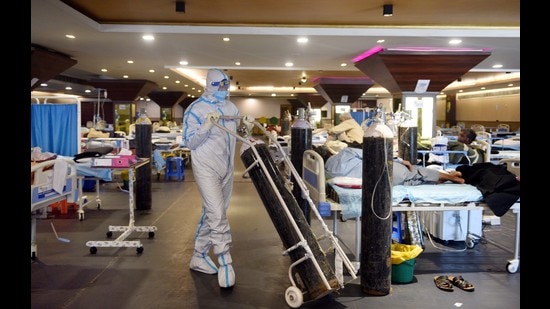Making India self-reliant in health care
The ₹64,180-crore Pradhan Mantri Ayushman Bharat Health Infrastructure Mission scheme focuses on creating the capacities of health institutions across all levels of care
The coronavirus pandemic presented to us a set of complex challenges, demanding a prompt response to the evolving situation in a manner that also facilitated rapid scaling up of the public health infrastructure, with an approach calibrated to the varying maturity of health systems across India. The emergency reiterated the need for a concerted and “whole of government” and “whole of society” approach to building comprehensive, robust, and prompt response systems. While the pandemic highlighted the importance of public health care, it also allowed us to understand the key strengths and weaknesses of the system.

We realised that significant investment is needed to strengthen health infrastructure, surveillance, and research capabilities, build the capacity to respond to outbreaks/disasters, and ensure the availability of essential services during such times. Such a response will also complement the country’s journey towards achieving the targets of the National Health Policy 2017 and the Sustainable Development Goals.
The ₹64,180-crore Pradhan Mantri Ayushman Bharat-Health Infrastructure Mission (PMABHIM) scheme focuses on creating the capacities of health institutions across all levels of care. It also aims to provide health infrastructure, surveillance and research to make the country self-reliant in these sectors, and enable states to respond effectively to public health emergencies. The scheme focuses on creating infrastructure at the district-level that is capable of surveillance and outbreak management, and can provide primary as well as critical care with equitable access to all citizens, especially women, children and those belonging to weaker sections.
Underlining the need for universal access to high-quality, comprehensive primary health care, the health and wellness centres (HWCs) created will enable attention to community and primary health care interventions in rural and urban areas. PMABHIM will provide infrastructure support to 17,788 HWCs in rural areas of high-focus states, including three Northeastern states.
The pandemic showed the importance of strengthening and expanding primary health care in urban areas. The government plans to enable the decentralised delivery of primary health care services closer to the citizens through 11,044 urban HWCs in collaboration with urban local bodies. These centres will serve 15,000 to 20,000 people each, in slums and vulnerable areas. New urban polyclinics are also being established for specialist services. In addition, the provision of free medicines, diagnostics, and access to tele-consultation services closer to the community is expected to expand coverage and quality of care in rural and urban areas.
Covid-19 highlighted that the sub-optimal health focus at the block-level led to a constrained public health response. Thus, the scheme proposes to establish 3,382 block public health units to address capacity deficits and enhance self-reliance at the sub-district levels. India’s disease burden also demonstrated the need for high-quality laboratory services at district and sub-district levels. So, investments are being made to establish integrated public health labs in 730 districts to develop and strengthen diagnostics and surveillance. This will contribute to building a self-reliant India with a comprehensive surveillance system.
During the pandemic, we also realised the severe impact on essential services in the absence of a provision of segregating a part of hospital buildings and specifically designating them for infectious diseases. To address the problem, 602 critical care blocks of 50-100 beds each will be set up in districts to enable the system to respond to health emergencies. For districts with less than 500,000 people, support is being provided by establishing referral linkages. Further, 150-bed critical care blocks in 12 central hospitals/institutions are being established. These will act as mentor institutions for providing technical assistance to states.
During Covid-19, central institutions of excellence provided mentorship to build the confidence of health care professionals and played an active role in critical- and tertiary-level health care service delivery. The institutes provide tertiary care interventions, but need strengthening to deal with infectious disease patients. The 150-bed critical care hospital blocks in 12 central institutions will also address this need. With this, 37,000 new critical care beds with ICU and oxygen support will be available in district facilities, thus making districts self-reliant in providing critical care in the coming five years.
PMABHIM, as the largest pan-India infrastructure scheme, aims to build a self-reliant India with a surveillance system with more than 4,000 laboratories. In addition, health units at 50 international points of entry will be strengthened for effectively detecting, investigating, preventing and combating public health emergencies. With this scheme, India will be the first in Asia to have an emergency response mechanism with two container-based mobile hospitals, and teams that can be rapidly deployed in emergency/crisis situations.
Increased investments are also targeted to support research on Covid-19 and other infectious diseases, including biomedical research to generate evidence to inform short-term and medium-term responses to Covid-19-like pandemics and develop core capabilities to deliver the one health approach to prevent, detect, and respond to infectious disease outbreaks in animals and humans. In addition, initiatives such as Integrated Health Information Platform and National Digital Health Ecosystem will enable the development of expertise and knowledge-sharing across institutions, and expand and facilitate rapid and timely responses in the future.
Tapping into the gains, redressing deficiencies, and instituting innovations and best practices for preparedness is the way forward in creating a resilient and self-sufficient India. PMABHIM is a game-changer. It is a booster to reinforce public health functions for optimal crises management, while safeguarding the delivery of routine and essential health services, thus, making our districts and states self-reliant, and making India atmanirbhar.
Mansukh Mandaviya is Union minister for health and family welfare
The views expressed are personal
All Access.
One Subscription.
Get 360° coverage—from daily headlines
to 100 year archives.



HT App & Website







